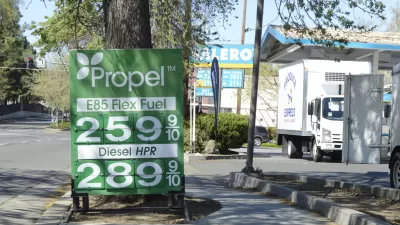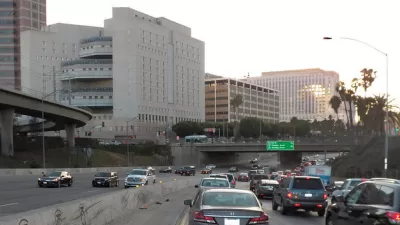The Trump administration has submitted revised fuel efficiency standards to the White House Office of Management and Budget for a final review. If approved, the rule would overturn a key environmental initiative of the Obama administration.

"The Trump administration is moving forward with a plan to roll back stringent gas-mileage rules enacted by the Obama administration," reports Keith Lang.
The Trump administration has submitted a final version of the proposed changes to the fuel economy standards, but the public has yet to see the details of those changes. The plan, however, "is expected to call for reducing the required annual fleetwide average mpg increases for carmakers for model years 2021-2026 from the original 5% to a less stringent 1.5%."
The article includes more details on the political and legal process that has preceded the administration's submittal of the plan. Planetizen has been tracking the Trump administration's plans to revise the country's fuel efficiency standards as well as other automobile-related environmental regulation. Most recently, several car companies from around the world decided to work with the Trump administration against the more stringent auto emissions standards enforced by the state of California.
FULL STORY: Trump administration moves to finalize fuel-economy rollback

Planetizen Federal Action Tracker
A weekly monitor of how Trump’s orders and actions are impacting planners and planning in America.

Restaurant Patios Were a Pandemic Win — Why Were They so Hard to Keep?
Social distancing requirements and changes in travel patterns prompted cities to pilot new uses for street and sidewalk space. Then it got complicated.

Map: Where Senate Republicans Want to Sell Your Public Lands
For public land advocates, the Senate Republicans’ proposal to sell millions of acres of public land in the West is “the biggest fight of their careers.”

Maui's Vacation Rental Debate Turns Ugly
Verbal attacks, misinformation campaigns and fistfights plague a high-stakes debate to convert thousands of vacation rentals into long-term housing.

San Francisco Suspends Traffic Calming Amidst Record Deaths
Citing “a challenging fiscal landscape,” the city will cease the program on the heels of 42 traffic deaths, including 24 pedestrians.

California Homeless Arrests, Citations Spike After Ruling
An investigation reveals that anti-homeless actions increased up to 500% after Grants Pass v. Johnson — even in cities claiming no policy change.
Urban Design for Planners 1: Software Tools
This six-course series explores essential urban design concepts using open source software and equips planners with the tools they need to participate fully in the urban design process.
Planning for Universal Design
Learn the tools for implementing Universal Design in planning regulations.
Heyer Gruel & Associates PA
JM Goldson LLC
Custer County Colorado
City of Camden Redevelopment Agency
City of Astoria
Transportation Research & Education Center (TREC) at Portland State University
Camden Redevelopment Agency
City of Claremont
Municipality of Princeton (NJ)





























